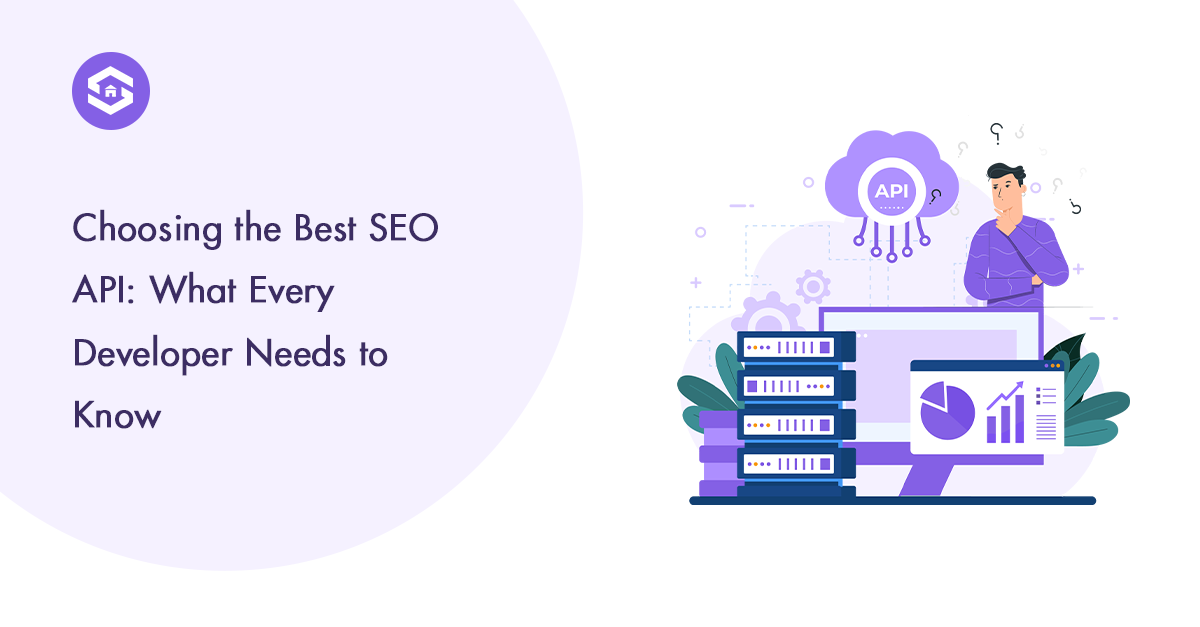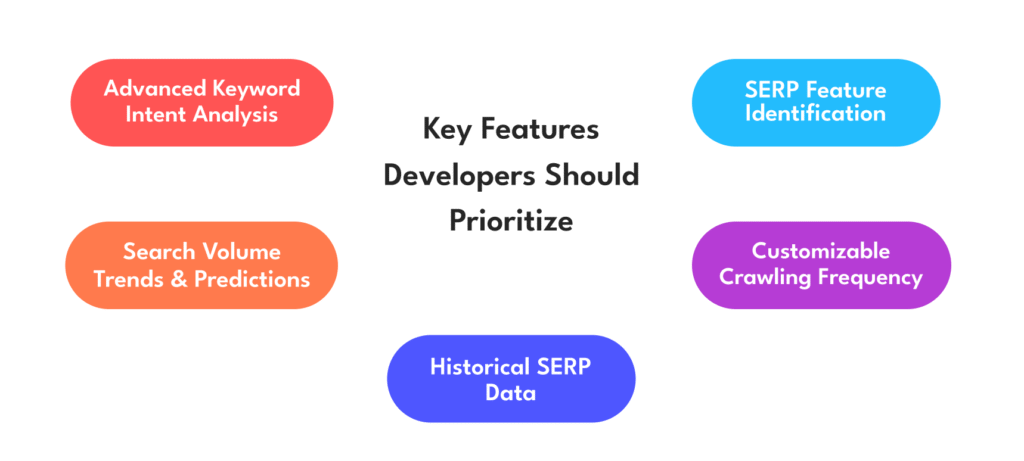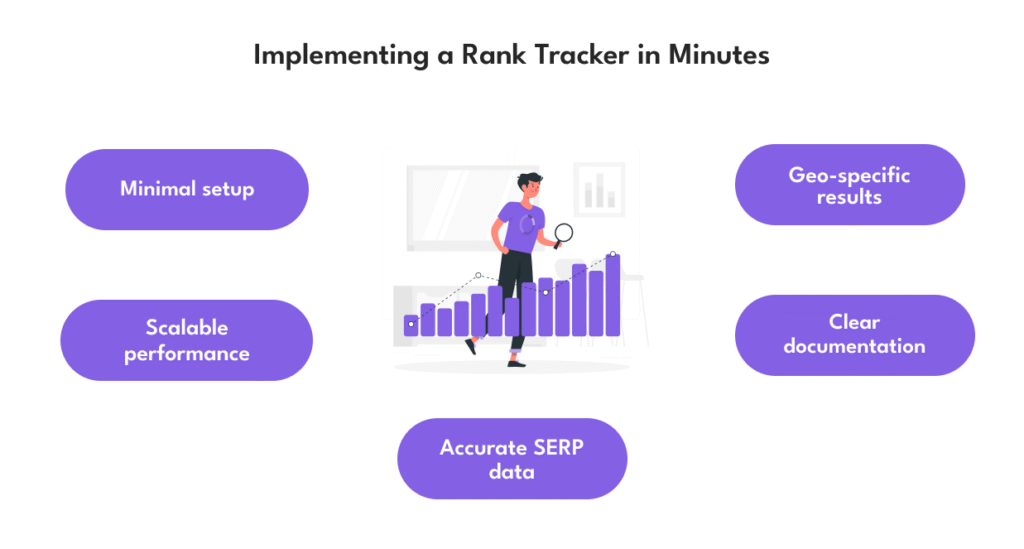A Developer’s Guide to Picking the Best SEO API in 2025
8 min read
8 min read

Table of Contents
Table of Contents
For developers working in the accelerated SEO world, efficiency and accuracy are everything. This is exactly why finding the Best SEO API has become crucial—it offers instant access to essential research data without the need for manual scraping or constant maintenance. With just a few lines of code, developers can integrate powerful insights directly into their platforms or dashboards.
A great advantage is the ability to track keyword rankings in various locations and devices in real time. Developers no longer need to rely on outdated reports or manually compiled spreadsheets. Instead, they use APIs that provide real-time Serp data instantly, keeping the current and actionable SEO tools.
Another reason for its popularity is automated reports. By connecting an SEO API with a report system, developers can create fully automated updates for customers or marketing teams-saving hours of repetitive work.
In addition, modern APIs are designed to be scalable and friendly to developers. Whether you create a small internal tool or a large-scale SAAs product, scalable data extraction and high request limits make perfect integration.

Although the usual features, such as real-time tracking and geo-targeting, are essential, there are other aspects of an SEO API that developers should look for in efficient and personalized SEO tools. These exclusive features can help make their integration perfect and more powerful.
Not all words are created equal. Look for an API that includes a keyword intention analysis. This feature helps to identify whether a keyword is informative, transactional or navigation, allowing for better targeted content and optimization strategies.
Instead of just looking for keyword rankings, APIs that provide search volume trends and keyword predictions give developers the tools to predict future performance. This can help in the elaboration of long-term SEO strategies based on the upcoming search trends.
Some APIs can identify SERP features (such as excerpts highlighted, knowledge panels or image packages) that appear in the search results. Understanding these elements is essential for developers aiming to create tools that focus on extracting more than just traditional organic results.
Not every SEO campaign needs updates every hour. APIs, allowing developers to define personalized tracking frequencies, provide flexibility to optimize costs and data recovery based on customer needs, whether daily, weekly or campaign.
Access to SERP’s historical data is invaluable for tracking long-term trends. APIs that allow developers to pull historical search rankings to help SEO teams monitor keyword performance over time, allowing a deeper analysis of SEO efforts and more informed decision-making.
When working with SEO APIs or any other web-based service, the response format, or method by which data is returned, is just as crucial as the data itself. Two of the most popular forms are JSON (JavaScript Object Notation) and XML (Extensible Markup Language). Each has advantages, and developers typically choose one over the other based on the project’s objectives.
JSON has become the favourite format for most developers today. It is minimal, easy to read and maps cleanly for most programming languages. It is also ideal for real-time SEO data integration due to its faster analysis speed.
Although XML is heavier, it offers greater flexibility for complex data structures. Some developers still prefer it when dealing with corporate SEO platforms, where validation, strict scheme application or advanced configuration is required.
JSON is usually the smartest choice if you are building a modern and fast SEO tool due to its speed and simplicity. However, for more robust systems that require validation of the data structure or deal with legacy SEO tools, XML can still play an essential role.
Talk to experienced developers who work with SEO APIs and you will hear a mix of emotion and some difficult lessons learned. Most praise the speed and simplicity of real-time keyword monitoring, especially when dealing with large-scale projects. Tools that offer data and support to SERP accurate SEO tracking are consistently valued in general.
However, many developers admit that they regret ignoring the quality of API documentation from the beginning. Incomplete documents usually lead to delays, integration errors and wasted hours. Others mention challenges with fee limits, especially when performing bulk queries, which can become silent bottlenecks in high-demand environments.
Another common regret? Ignoring the flexibility of the response format. The choice of an API that supports only XML – or does not offer structured JSON – usually results in an extra overload.

When a fast-growing digital agency needed to launch a lightweight rank tracking tool for their clients, speed and accuracy were non-negotiable. They chose a Google Search Ranking API that offered easy documentation, JSON response format, and real-time support for localized SERP results.
Within just minutes, their developer was able to integrate the API into their internal dashboard using standard HTTP requests. By specifying the target keyword, location, and device type, they began pulling live keyword ranking data without building any scraping logic from scratch.
Here’s what made the process seamless:
In less than an hour, the agency had a fully functional rank tracking dashboard with automatic daily updates, flexible reporting options, and visual keyword trends. Their clients could now monitor their position for high-priority search terms without waiting for third-party reports.
The best part? The tool required minimal maintenance, thanks to the API’s reliability and consistent response structure. This case proves that with the right SERP API provider, even small teams can implement powerful SEO solutions at scale.
Choosing the right SEO API for your project is not just choosing the most popular tool – it is about finding a solution that meets your specific technical needs, scale and environment. Whether you build a custom rank tracking panel or manage thousands of keywords in various geographies, the best SEO API will offer more than just raw data.
Start by identifying what you really need: Do you need real-time SERP updates for accurate monitoring? Are you segmenting various search engines or just Google? And what is the importance of obtaining localized search results? These questions will help you filter generic apis that do not align with your strategy.
Some apis shine in scalability, offering robust processing of bulk keywords. Others stand out with clean JSON responses, easy integration and flexible prices for startups or small development teams. If the speed is critical, focus on APIs with low latency responses and reliable activity time.
Remember to check the rate limits, support the response capacity, and if the provider allows to customize location types, language and device. This may seem small, but dramatically affect long-term performance and usability.
In short, the best SEO API is the one that balances accuracy, scalability, and simplicity—without compromising on the essential features your project can’t live without.
When it comes to selecting the right SEO API for your project, there is no unique solution. What works brightly for a high-volume ranking tracking platform may not adapt to a lightweight keyword audit tool. This is why your decision should always be guided by your project’s goals, budget and technical stack.
If your priority is real-time SERP data, look for specialised APIs in speed and freshness. For large-scale operations, scalability and keyword handling must be at the top of your list. And if you are focused on specific regions, it does not compromise access to SEO local data – this is what gives your reports true accuracy.
In the end, the best SEO API is the one that integrates smoothly, provides consistent results and supports your workflow without adding complexity. Be sure to test the documentation, check the support response times and evaluate performance during high traffic periods.